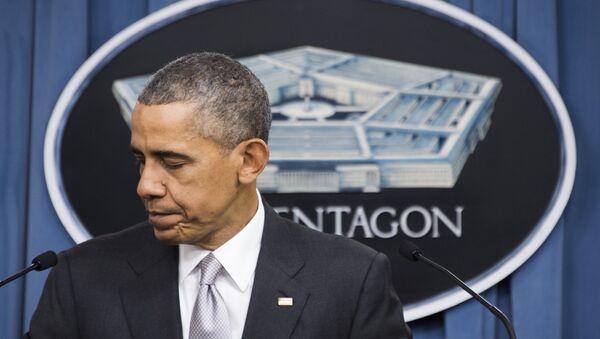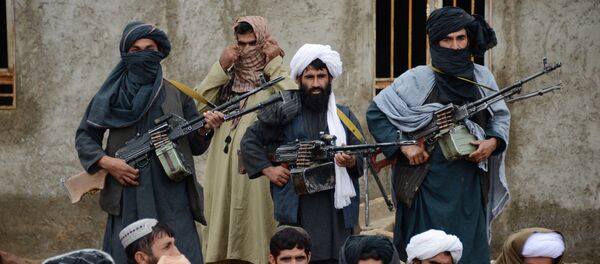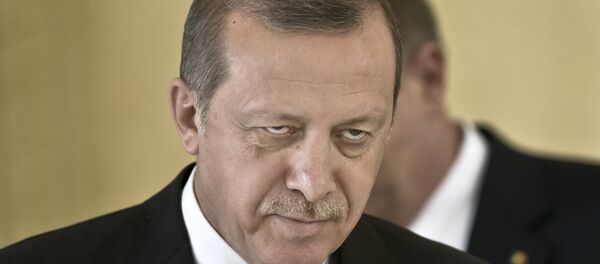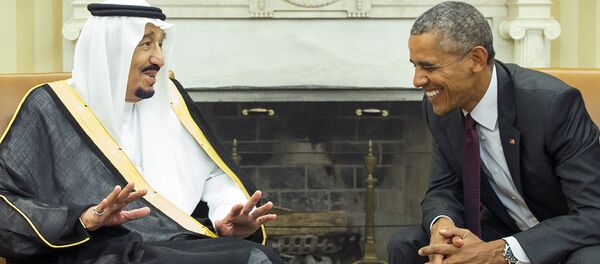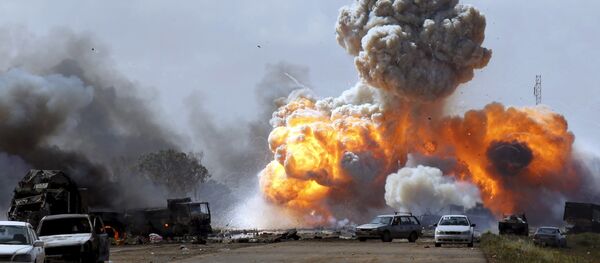Afghanistan
Since 2002, US Congress has appropriated $113 billion into rebuilding Afghanistan, with sixty percent of funding dedicated to training and developing an indigenous security force — one that can hopefully withstand Taliban onslaughts in the wake of a US-NATO drawdown.
"The Taliban now controls more territory than at any time since 2001," US Special Inspector General for Afghanistan Reconstruction (SIGAR) chief John Sopko said in an audit report released on January 30, 2016. "Afghanistan proved even more dangerous than it was a year ago."
After the International Security Assistance Force (ISAF) wound up its large-scale mission in Afghanistan at the end of 2014, the United States and NATO launched Operation Resolute Support — a follow-on mission focused on advising and assisting local forces and counterterrorism operations.
President Barack Obama intended to drawdown US forces to a residual presence in Afghanistan by 2017, but the resurgence of the Taliban and rise of Daesh forced him to reverse course.
"I am announcing an additional adjustment to our posture. Instead of going down to 5,500 by the end of this year, the United States will maintain approximately 8,400 troops in Afghanistan into next year through the end of my administration," Obama announced in July.
NATO Resolute Support Mission Commander Gen. John Nicholson said in a briefing in September he was worried by the rising casualty rate among Afghan security forces while human rights groups decried the spike in civilian deaths.
The US military reported that 5,523 ANDSF service members were killed and an additional 9,665 wounded in the first eight months of 2016 for a total of 15,188, a casualty rate military officials have said is running 20 percent higher than 2015.
The UN Assistance Mission in Afghanistan reported that the 1,601 civilians killed and 3,565 injured in the first six months of 2016, the highest recorded since 2009.
Corruption and wasteful spending was another major problem that plagued US reconstruction efforts in 2016. SIGAR revealed that US taxpayer money has been wasted and all the blame cannot be placed on Afghan President Ashraf Ghani and CEO Abdullah Abdullah.
"The United States contributed to the growth of corruption by injecting tens of billions of dollars into the Afghan economy, using flawed oversight and contracting practices, and partnering with malign powerbrokers," SIGAR said in a report published on September 14.
The US military sparked controversy in April when the Pentagon announced the results of a probe into the 2015 US airstrike on a hospital in Kunduz that killed more than 40 staff and patients. The US military claimed the strike did not constitute a war crime because pilots did not "intentionally" target civilians.
In November, in a similar vein, the United States refuted an International Criminal Court (ICC) probe that found US personnel may be guilty of war crimes for torturing prisoners.
"We [the United States] do not believe that an ICC examination or investigation with respect to the actions of US personnel in relation to the situation in Afghanistan is warranted or appropriate," State Department spokesperson Elizabeth Trudeau told reporters November 15. "We believe that we have national systems of accountability that are more than sufficient."
All signs indicate the war in Afghanistan is not likely to end anytime soon in light of nonexistent peace talks between the government and insurgents and the fact Pakistan continues to provide safe haven to the Haqqani network and other Taliban leaders, according to a Pentagon report released in December.
Turkey
US relations with NATO ally Turkey began deteriorating at the outset of 2016 primarily due to Washington’s support for Syrian Kurdish Democratic Union Party (PYD) forces and its refusal to hand over Muslim cleric Fethullah Gulen, who Ankara has accused of playing a key role in the July coup attempt.
The US military has provided support to PYD fighters to counter Daesh in Syria despite the fact Ankara considers the PYD to be an affiliate of the Kurdistan Workers’ Party (PKK), a designated terrorist outfit which has been fighting for independence from Turkey since 1984.
After the July 15 military coup attempt in Turkey, which was suppressed the following day after 240 people were killed and some 2,000 wounded, Ankara demanded that the United States hand over Gulen who was living in the US state of Pennsylvania since 1999.
In October, Erdogan warned Washington that Turkey could "resort to very serious steps" if the United States continued to delay Gulen’s extradition.
The State Department, for its part, said the Justice Department must review the evidence provided by Turkey to validate a crime was committed and get a court order authorizing the extradition.
Erdogan, two months later, said he was "disillusioned" with Obama for not handing over Gulen in an expeditious manner as Turkey would have done upon Washington’s request.
"I served both as a prime minister and president in this country [Turkey], and whenever the United States requested extradition of those kinds of terrorists, I handed them over," Erdogan told CBS News. "Obama also should have done it and handed that man to us."
Washington’s repeated criticism of alleged human rights abuses in Turkey, ranging from the detention of thousands of opposition figures, journalists, academics and other regime critics and violence against Kurdish citizens, have also rankled Turkish officials.
Yemen
The United States has garnered international opprobrium for supporting and providing weaponry to Saudi Arabia which is leading a Sunni State coalition in conducting airstrikes on positions in Yemen that have killed scores of civilians, including strikes on hospitals, weddings, funerals and markets.
The UN estimates that more than 10,000 civilians have been killed or wounded during the campaign since the campaign was launched in March, 2015.
In March, the International Campaign to Ban Landmines-Cluster Munition Coalition reported that most of the cluster munitions used by the Saudi-led coalition had been produced in the United States. As a result, several human rights groups have called on Washington to ban weapons sales to Saudi Arabia.
In August, a group of 60 US lawmakers called on Obama to postpone the sale of $1.15 billion worth of arms and ammunition to Saudi Arabia because of the impact Riyadh’s military campaign has had on civilians in Yemen.
Congressman Ted Lieu in a letter to Secretary of State John Kerry expressed concerns that the United States might be liable for war crimes in Yemen.
"Immediately stopping the aiding and abetting of the Saudi military coalition would not only help reduce the legal risk to US officials, it would send a strong message to the world that the US respects the Law of War and basic human rights," Lieu said on October 13.
Kerry, meanwhile, has failed in his efforts to support a durable UN-brokered ceasefire between the warring parties in Yemen.
Other Challenges
The United States and its allies failed to reverse declining security conditions in civil war-torn Libya, which descended into chaos after the US-backed military intervention in 2011 that overthrew longstanding leader Muammar Gaddafi, allowing Daesh to gain a foothold in the country.
Relations with China took a turn for the worse in 2016 after the United States sent a warship through the South China Sea, the center of controversy in the region due to conflicting claims over territory between Beijing and several other countries.
The Obama administration suffered a significant setback with the failure to pass the Trans-Pacific Partnership (TPP) agreement, which the White House had touted as a landmark trade deal.
US support of Ukraine showed little results as Kiev failed to abide the Minsk accords and continues to be plagued by corruption and debt.
The US-led coalition has made mild gains in 2016 in the fight against Daesh in Iraq, however, some operations have led to blowback in Syria, such as the offensive to retake Mosul.
"The process of squeezing of large groups out of Iraq for various reasons is evident, which allows them to form large terrorist groups on the Syrian territory and launch offensive actions," Kremlin spokesman Dmitry Peskov told reporters on December 12.
The United States saw mixed results in its relations with Tehran as well – such as taking steps to implement the nuclear agreement while clashing on the high seas. In January, Iran’s Islamic Revolutionary Guard Corps (IRGC) seized a US navy ship that had inadvertently entered Iranian waters due to a mechanical malfunction.
The United States took positive steps towards normalizing relations with Cuba, however, Obama failed to close the detention center in Guantanamo Bay – a promise he made upon entering office in 2009.
Obama failed to salvage his foreign policy legacy in 2016 and will leave countries like Afghanistan, Yemen, Libya and Syria, among others, more unstable than when he took office eight years ago. Moreover, there is a high probability Obama’s few foreign policy achievements — such as the historic breakthrough in US-Cuban relations — might be reversed by the incoming administration of President-elect Donald Trump.

